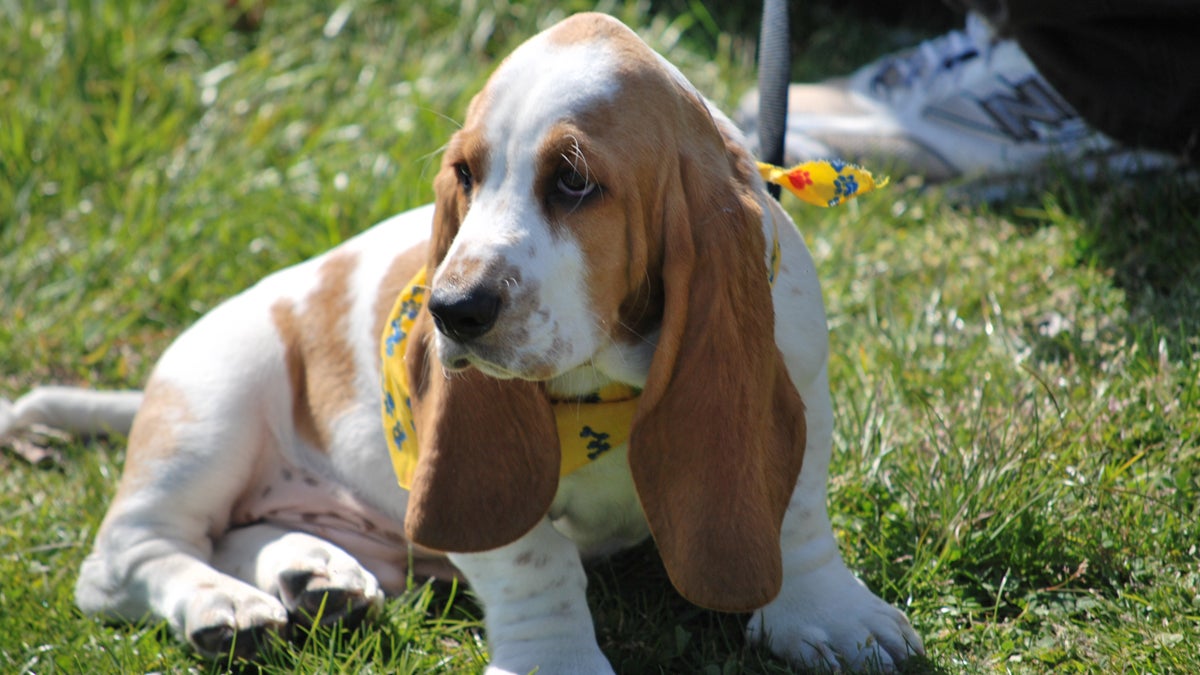6 ways to keep your dog from going nuts during the fireworks

Look at that face! You want to upset this little guy? (Of course you don't.) Larry the Bassett hound is shown at the 2012 Basset Waddle Parade in Ocean City, New Jersey. (Elisabeth Perez-Luna/WHYY)
Years of experience and friends’ stories have taught me that, when dogs hear fireworks, they don’t howl out of enjoyment and awe, but rather pain, horror and fear. The noise, the sulfur smell and flashing lights upset them. Here are a few tips to keep your companion calm and safe.
I’m lucky. I live in a Philadelphia neighborhood where dogs — and the kind people who adopt them — abound. But I find that many of these open-hearted people don’t know anything about their dog’s behavior. Dogs usually don’t come with a user’s manual, but years of experience and friends’ stories have taught me that, when they hear fireworks, dogs don’t howl out of enjoyment and awe, but rather pain — real pain — horror and fear. The noise, the sulfur smell and flashing lights upset them.
So here are a few tips compiled from vets, friends, adoption centers and assorted dog lovers. Got suggestions of your own? Tell us in the comments.
1. Please leave your dog at home, indoors.
Keep your dog safe at home during festivities involving fireworks — or any other noisy, people-filled gatherings. Your dog loves reassuring and familiar surroundings (just like some of us!). They love their blankets, rugs, and beds; your sofa, bed, and closets; piles of towels in laundry rooms; whatever.
2. Walk your dog before the noise begins.
Give your pet some exercise and a chance to do his or her business — even if you will be staying at home. Remember: If the animal gets excited from the commotion outside, accidents may happen. Reprimanding the poor, scared creature won’t help much.
3. Close curtains, blinds and shades.
The SPCA recommends you close curtains and shades to block flashing lights from fireworks. They, of course, strongly advise that you close windows, doors, cat flaps and other possible escape routes. We all know stories of spending hours trying to find stranded and lost dogs and cats. They do get disoriented and might not be able to recognize their surroundings to get back home. So make sure your pet’s ID tag has the correct information with your pet’s name, your name and your cell phone number.
4. If your pet is used to ambient noise, leave your radio or TV on.
Some dogs like the radio on. Larry, my Bassett hound, and Lilly, my cat, complain when I don’t leave my radio tuned in to WHYY! (Go figure.) If your pet is used to sounds in the home, leave the TV, radio or music on when you leave.
5. Leave plenty of water and some food.
Keep your dog comfortable with feed and water and familiar toys and treats. Try to leave enough space for your dogs or cats to roam, circulate, complain, whine, whimper. They’re trying to find their comfort level. They might want to find hiding places, especially cats. Let them.
6. Do not to cuddle or control a distressed pet.
Here’s one I didn’t know about from the SPCA of Auckland, New Zealand: Try not to cuddle and control distressed pets. This may make the problem worse. Your behavior will make them think that you are worried too, and, wanting to protect you, your dog will experience even more stress. Instead, stay relaxed, act normally, and praise your dog’s calm behavior.
WHYY is your source for fact-based, in-depth journalism and information. As a nonprofit organization, we rely on financial support from readers like you. Please give today.




